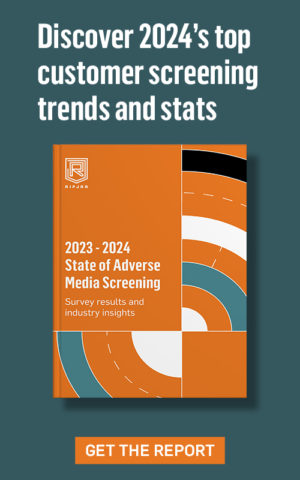Successful Anti-Money Laundering (AML) and Counter-Financing of Terrorism (CFT) regulations depend on banks and financial service providers understanding the identities of their customers. However, when customers engage with financial services using companies or complex corporate structures, banks must work harder to meet their AML/CFT obligations by establishing ultimate beneficial ownership.
What is Ultimate Beneficial Ownership?
An ultimate beneficial owner (UBO) is the real person (sometimes referred to as ‘natural person’) who owns or controls a customer account at a bank or financial service provider. In this context, natural persons are distinct from ‘legal persons’ which refers to entities like companies. Ultimate beneficial ownership becomes an AML risk factor when banks do business with customer-entities such as companies or with individuals that are not going to be the beneficiaries of a given transaction.
Ultimate beneficial ownership is a significant AML concern in jurisdictions around the world. The Financial Action Task Force (FATF) defines a UBO as:
“the natural person(s) who ultimately owns or controls a customer and/or the natural person on whose behalf a transaction is being conducted. It also includes those persons who exercise ultimate effective control over a legal person or arrangement.”
In this context, FATF considers a natural person to be a beneficial owner if that person meets any of the following criteria:
- Owns 25% of an entity’s capital or share capital.
- Has 25% or more of an entity’s voting rights.
- Is the legal guardian of a customer who is a minor.
- Has power of attorney over the customer.
- Is a holder of anonymous bearer shares in a company.
- Is a corporate director specifically appointed to conceal a true owner.
UBOs and the FATF ‘Travel Rule’
Following a consultation in 2021, the FATF is considering amendments to Recommendation 24 as it pertains to ultimate beneficial ownership. Known as the ‘Travel Rule’, Recommendation 24 requires financial service providers to share information about the originators and beneficiaries of transactions in order to inform AML/CFT compliance.
The proposed UBO revisions, outlined in 2021, would require banks and other financial institutions to:
- Retain beneficial ownership information in a registry (or alternative mechanism).
- Ensure that beneficial ownership information is ‘adequate, accurate, and up to date’ and “sufficient to identify the natural person(s) who are the beneficial owner(s)”.
In order to determine beneficial ownership, the FATF suggests that service providers should acquire certain basic points of information, including ‘at a minimum’ details of the company’s ‘legal ownership and control structure.’ The FATF also emphasised the need for ‘the widest possible range of international cooperation’ in order for service providers to be able to identify UBOs quickly and efficiently.
Ultimate Beneficial Ownership and AML
UBOs can present such a high level of AML risk because they may use corporate infrastructure to conceal the true nature of their business, or their identities in order to avoid the scrutiny of compliance controls. FATF sets out AML guidance relating to ultimate beneficial ownership in Recommendation 24 – which requires member-states to “take measures to prevent the misuse of legal persons for money laundering or terrorism financing”.
Following FATF guidance, when individual customers are involved in transactions, financial service providers establish their identities by performing suitable due diligence and requesting official documentation such as birth certificate, driver’s licence, or passport. However, where a customer is a company or corporate entity, it is not possible to establish identity in the same way – and so service providers must establish, and verify, ultimate beneficial ownership in order to properly assess the risk that they face.
UBO and Shell Companies
One of the most common criminal threats associated with ultimate beneficial ownership is the use of shell companies. While shell companies are often established for legitimate purposes, they are frequently used by money launderers to conceal the identity of their owners, and thwart the scrutiny of AML controls, by exploiting international regulatory disparity and complex corporate infrastructure.
A shell company is a corporate entity that is set up to protect or hide the assets of another person or company. Normally established without any physical premises, assets, or even employees, shell companies enable criminals to hide behind corporate infrastructure while they introduce illegal money into the legitimate financial system. In some foreign jurisdictions, shell companies can be set up anonymously – and then used to evade AML scrutiny.
Global AML risks: The scale of global criminal misuse of shell companies has been revealed in the release of confidential documents over the past decade. Notable examples include the Panama Papers in 2016 and the FINCEN Files in 2020, both of which exposed the ways that criminals, including political officials, use shell companies in low regulation international jurisdictions to disguise significant amounts of illegal funds. The Panama Papers leak enabled global authorities to recover $500 million in lost revenue, while the FINCEN Files exposed the complicity of prominent banking institutions in supporting the criminal activity.
Shell companies are not just a foreign jurisdictional problem. In the UK, for example, shell companies may be used to open and access bank accounts in other parts of the world, including low regulation jurisdictions – such as the Baltic states.
According to financial crime SME and Director at The Dark Money Files Ltd, Graham Barrow, UK shell companies are a particularly attractive option for international money launderers thanks to new rules which have prompted a move away from the “old fashioned way of forming a company” – by post to Companies House – and towards “an online portal where, in minutes, at a cost of a mere £12, anyone, anywhere in the world can become the owner of their own business”
“While without a doubt it has encouraged much positive economic activity,” said Barrow “it has also attracted a shady side of the global economy – dark money. Money of uncertain, possibly corrupt, or criminal origin”.
The scale of that dark money threat has prompted regulatory responses. Law enforcement authorities around the world, for example, have used the information revealed by the Panama Papers and FINCEN Files leaks to initiate investigations of the individuals and organisations involved, resulting in multiple criminal prosecutions.
Ultimate Beneficial Ownership AML Red Flags
In order to identify potential money laundering activities, including the misuse of shell companies, organisations should be vigilant for the following UBO red flags:
- Customers that provide insufficient or incomplete information about the beneficiaries of their transactions.
- Companies that send wire transfers with unusual frequency or to an unusual number of beneficiaries.
- Companies that engage in transactions that seem unusual for their industrial sector.
- Companies that engage in transactions irregularly or only sporadically.
- Transactions in amounts that are not typical of a company’s wealth profile.
- Transactions that involve sender or beneficiary companies in off-shore locations or in high risk AML jurisdictions.
- Payments which may not be traced to bank accounts and which are only traceable via reference to a company invoice or contract.
Compliance technology: Using these red flags to stop criminal activity should be a priority for service providers. With that in mind, sophisticated banks and other organisations are demanding solutions which integrate machine learning and other analytic techniques to unravel and interpret the vast amounts of complex data – generated by sources all over the world – necessary to address UBO concerns.
UBO Regulatory Responses
In the wake of the FINCEN Files and other leaks, governments around the world have implemented dedicated UBO legislations and measures to prevent the misuse of shell companies.
United Kingdom: The UK introduced a register of company beneficial ownership in 2016 with the People with Significant Control (PSC) Register. There are plans to introduce similar beneficial ownership registers for properties and land, and for trusts.
European Union: The EU’s Fourth Anti-Money Laundering Directive required member-states to develop and implement domestic UBO registers. Individual states were permitted to implement the registers via domestic legislation – which had led to inconsistent regulatory environments across the bloc. Latvia is a good example of a country that has put a number of stringent controls in place – as it seeks to improve its reputation after earlier scandals.
United States: In late 2020, the US passed the Corporate Transparency Act which requires organisations across the country to report beneficial ownership information to the government. The law was supposed to come into effect on 1 January 2022 but missed that deadline following administrative delays in 2021.
Singapore: In 2017, Singapore introduced a requirement for companies to maintain a Register of Registrable Controllers (RORC), containing beneficial ownership information. Since July 2020, companies in Singapore have also been required to report that information to the Accounting and Corporate Regulatory Authority of Singapore (ACRA).









